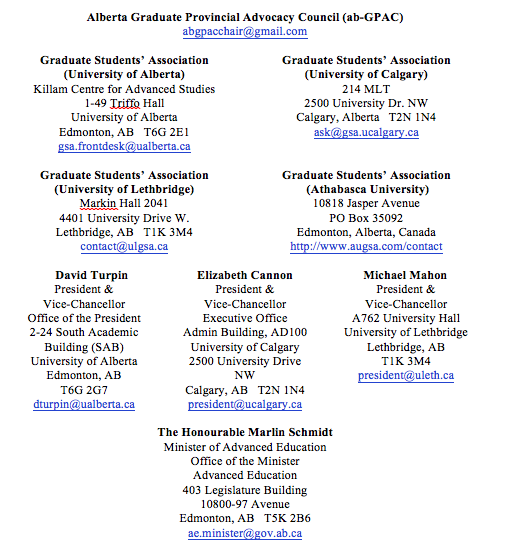27 February 2017
An open letter to:

Dear fellow stakeholders:
This open letter was written on behalf of the Graduate Students of English Collective (GSEC) at the University of Alberta (U of A). It is our formal statement of objection regarding the U of A Graduate Student Association’s (GSA) stance on the continued infringement upon our constitutional and human rights to legal organization by the Post-Secondary Learning Act (PSLA). The purpose of this letter is twofold: to inform stakeholders across the province that the pro-PSLA position taken by the lobby group ab-GPAC, which was also echoed in a letter from University Presidents to the Minister of Advanced Education, cannot be representative of graduate students; and to call for the GSA at the U of A to conduct transparent and robust consultation regarding the pursuit of union representation.
As it currently stands, the January 30, 2015 decision by the Supreme Court of Canada in the case of Saskatchewan Federation of Labour v. Saskatchewan sets a clear precedent for the GSA and other graduate students’ collectives or associations to pursue union representation. Yet, the President of the GSA at the U of A co-authored an official statement with ab-GPAC, claiming that graduate students across the province would prefer to remain under the PSLA and thereby forfeit their constitutional right to freedom of association. While we are aware that the GSA initiated a consultation with graduate students in its Special Bulletin of September 28, 2016, this email allowed less than a week for responses. This was insufficient consultation with the GSA membership at large. Moreover, the pursuit of union representation was discussed only once amongst GSA councillors in their September meeting. There was no clear consensus on that matter, and the GSA’s position regarding unionization was never put to a formal vote. Instead, ab-GPAC and the GSA Board expressed to the Minister of Advanced Education that maintaining the PSLA in its current form “is the only option that can allow graduate students to function in all of their roles without harsh and undue consequences”[1] because of their precarious relationship to the University as their employer. This position was taken after receiving only 62 responses from graduate students across the province. Ab-GPAC represents at least 15,000 graduate students in Alberta, 7,000 of whom are enrolled at the U of A. Therefore, the GSA Board members who sit on ab-GPAC should not have considered 62 respondents a representative sample of either the province or the U of A when it comes to the important decision of whether or not graduate students should be able to form or join unions.
GSEC is dismayed by the GSA Board’s unwillingness to inform the GSA Council or membership of its position on unionization. In not taking a position independent of ab-GPAC, the GSA has failed in its mandate to represent its constituents. Furthermore, neither of these groups has made any effort to be transparent. It took ab-GPAC three months to respond to GSEC’s requests for its official statement and the GSA has not disclosed to GSEC any documentation related to their decision-making process. The PSLA infringes upon the Canadian constitutional right to freedom of association and discriminates against all academic workers based on source of income — a protected ground under the Alberta Human Rights Act. The most direct consequence of this infringement for graduate students is that they remain under the false impression that they cannot pursue union representation. This is a critical issue that necessitates fair and accurate consideration of graduate students’ views and adequate discussion regarding unionization options. While the official consultation deadline on the issue of unionization passed on October 17, 2016, we believe there is no official end date for democratic engagement.
The GSA Board has acted undemocratically when constitutional and human rights are at stake. Whether for or against unionization, graduate students should have been given a fair chance to weigh in on this debate, which is changing the landscape of labour relations in Alberta. GSEC acknowledges that unionization is a complex issue. To understand the costs, benefits, risks, and rewards of unionization requires time and effort on individual and institutional levels. GSEC members, and all GSA members, deserve to enjoy the full range of constitutional and human rights. These rights should not have been surrendered.
In accordance with this position, we call on the GSA to:
- Conduct transparent representation through fair and democratic consultation. Such consultation would include a town hall and also adequate time for conducting surveys, interviews, meetings, or any other means of allowing graduate students at this institution the opportunity to voice their opinions on the issue at hand.
- Make publicly available any letters, minutes, or documentation between the GSA and ab-GPAC pertaining to the GSA’s position on unionization.
We trust that proper consultation and representation are the goals of the U of A GSA and other stakeholders. We look forward to working with the GSA to initiate and to facilitate a more formal and transparent consultation process because all 7,000 graduate students at the University of Alberta deserve full expression of their constitutional and human rights.
We, the undersigned,
Graduate Students of English Collective (GSEC)
Department of English & Film Studies
3-5 Humanities Centre
University of Alberta
Edmonton, AB T6G 2E5
[1]Sarah Ficko et al. “ab-GPAC Labour Relations Response —Graduate Students.” Oct. 17, 2016.
